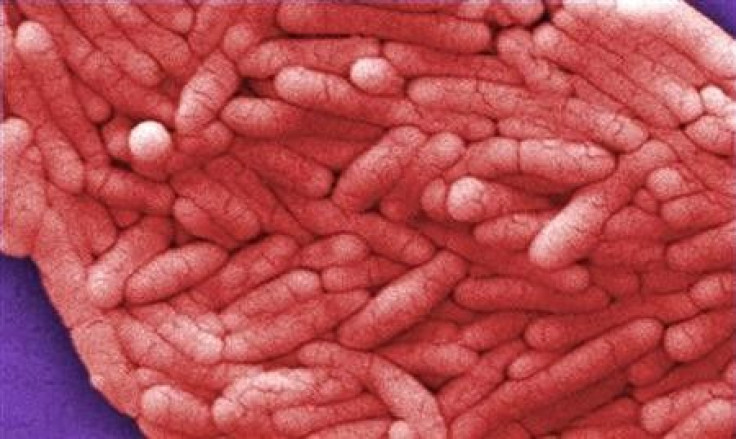Turkey recall raises U.S. food safety questions

U.S. food safety advocates are calling for changes to meat recall rules after regulators took months to warn the public about a Salmonella outbreak that has sickened nearly 80 people and caused one death.
Cargill Inc, one of the largest U.S. meat producers, on Wednesday recalled roughly 36 million pounds of fresh and frozen ground turkey produced at its plant in Springdale, Arkansas, after investigators linked the meat to a person who became ill with antibiotic-resistant Salmonella Heidelberg.
A government agency that tracks antibiotic-resistant pathogens found evidence of the contamination in Cargill ground turkey in early March, and the five-month lapse of time between that discovery and the recall has sparked a renewed debate about how the United States protects the public from tainted meat.
And the company said on Friday that Salmonella Heidelberg was detected at the Springdale plant even earlier than that March discovery.
Routine regulatory testing at the plant in June and July of 2010 found Salmonella Heidelberg on the surface of turkey before it was ground, Cargill spokesman Mike Martin said, but "no corrective action was required because of the low level found." Martin added that Salmonella Heidelberg is one of the most common of the 2,400-plus strains of Salmonella
Cargill's turkey recall was the third-largest meat recall in U.S. history. More importantly, it is the biggest-ever Class I recall -- which the government defines as "a health hazard situation in which there is a reasonable probability that eating the food will cause health problems or death."
"While determining the food source can be very challenging in an outbreak like this, I think the government unduly delayed in getting both information to the company and in issuing a public warning and recall," said Caroline Smith DeWaal, food safety director at the Center for Science in the Public Interest (CSPI), a consumer group.
Routine sampling by the National Antimicrobial Resistance Monitoring System (NARMS) turned up the outbreak strain in four ground turkey samples purchased from four retail stores between March 7 and June 27. That information made its way to regulators, but it took several months for investigators to definitively link the contaminated meat to reports of human illness, which also began surfacing in March.
Poultry and many other meats are regulated by the U.S. Department of Agriculture, which cannot move to recall a tainted product until a link to illness has been made.
One of the few exceptions to that is the finding of the particularly lethal bug E. coli O157 in meat, which starts the recall process.
Food safety attorney Bill Marler told Reuters that a "more logical approach" would be for USDA to adopt recall procedures like those used at the U.S. Food and Drug Administration.
FDA regulates about 80 percent of the U.S. food supply, including lettuce and other produce. It can push companies to recall a food that tests positive for a disease-causing pathogen, even if no illness has been reported.
BACKGROUND SALMONELLA
Roughly 10 to 15 percent of ground turkey in the United States is contaminated with Salmonella, which has proved one of the toughest pathogens to contain in the country's food supply, experts said.
DeWaal, of CSPI, has petitioned USDA to add Salmonella Heidelberg and three other antibiotic-resistant strains linked to prior outbreaks to its list of "adulterants," joining the deadly E. coli O157. That step would make selling food products that contain those pathogens illegal under federal law.
Attorney Marler also has urged USDA to extend adulterant status to all Shiga toxin-producing E. coli strains other than 0157. Such a strain was implicated in two deadly outbreaks that killed more than 50 people and sickened more than 4,400 others in Europe and North America.
"USDA should take action before people get sick, and require controls and testing for these pathogens before they reach consumers," DeWaal said.
While there were suggestions of a link between ground turkey and Salmonella Heidelberg illness as early as May, investigators didn't catch a break until July, when they found an opened package of the meat in the home of a patient.
Test results on July 29 confirmed the connection. USDA's Food Safety and Inspection Service issued a public alert and contacted Cargill.
The July 29 public notice, which warned of "an association" between eating ground turkey products and Salmonella Heidelberg infection, did not name the meat producer.
The Centers for Disease Control and Prevention also did not reveal the producer in its public announcement about the outbreak on August 1 -- even though preliminary information suggested that three of the four tainted samples found by NARMS came from the same production facility.
"Clearly the government needs to decide on an approach for using information from NARMS when there is a clear public health benefit from doing it," DeWaal said.
The Salmonella Heidelberg outbreak also has renewed calls for curbing the practice of feeding healthy animals low doses of antibiotics to speed growth.
Salmonella Heidelberg cannot be treated with some common antibiotics, including ampicillin, tetracycline and streptomycin, which CDC said may explain higher hospitalization rates than what are seen in other Salmonella outbreaks.
"This outbreak offers stark casualties from our collective failure to keep antibiotics out of animal feed," said Steven Roach, Public Health Program Director at Food Animal Concerns Trust and a member of the group Keep Antibiotics Working.
© Copyright Thomson Reuters 2024. All rights reserved.











